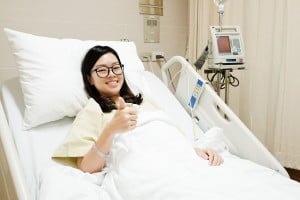Women who suffer from Chronic Pelvic Pain can gain big quality of life improvements by finding the right treatment for their symptoms.
Dr. Ben Abdu works with patients on options like medication and surgery, as well as alternatives like healthy eating, exercise and acupuncture.
He takes a multidisciplinary approach to treating the condition, since it often has more than one cause.
Chronic Pelvic Pain can be debilitating and keep women from doing what they love. It can also be hard to diagnose and cure.
However, managing the symptoms leads to vast quality of life improvements. “If you can control the symptoms, even without a cure, it’s a huge leap forward,” said Ben Abdu, MD, FACOG, director of Regional One Health’s Minimally Invasive GYN Surgery Division.
Dr. Abdu said there are several options based on each patient’s unique situation.
The right medication can help.
For Dr. Abdu, that rarely means an opioid prescription. The only time he prescribes opioids is for acute post-surgical pain. “I don’t use narcotics for symptom management. You can create an opioid dependence in 10-14 days. It’s just a Band-Aid, and it’s going to create a worse problem.”
His go-to is prescription-strength ibuprofen. NSAIDs like ibuprofen are both painkillers and anti-inflammatories. Inflammation is a big cause of CPP, so NSAIDs are effective but not addictive.
Patients who can’t take ibuprofen due to kidney or liver issues can use acetaminophen products.
Hormone manipulation medication can also be useful. Dr. Abdu said patients with CPP linked to their menstrual cycle benefit from drugs that suppress the ovaries or control the menstrual cycle. Examples include birth control pills, progestin, GnRH and the Mirena IUD.
Tricyclic antidepressants (TCAs) and Gabapentin have also shown success with pain relief.
Finally, Dr. Abdu also treats many patients with antibiotics. Pelvic Inflammatory Disease, which is a bacterial infection, is a common cause of CPP.
Surgery is also an option.
Even though Dr. Abdu is a surgeon, he exhausts all other paths first.
When surgery is the best option, he seeks the least invasive method. Some procedures are done through the vagina with no incision. Others require a small abdominal incision.
Dr. Abdu said diagnostic laparoscopy is the gold standard to diagnose CPP.

For some patients, surgery is the best option. Dr. Abdu always looks for the least-invasive method, with some procedures even being done with no incision.
He makes a small incision in the abdomen and inserts a thin viewing tube to view the reproductive organs. It takes about an hour and patients go home the same day.
Depending on the diagnosis, there are other laparoscopic surgical options:
- For endometriosis, ablation burns the tissue to destroy it and excision cuts it out. Dr. Abdu prefers excision for most patients.
- An ovarian cystectomy removes a cyst from the ovary.
- Lysis of adhesions involves cutting bands of scar tissue that form between organs.
- Cystourethroscopy and hydrodistension diagnose and treat issues with the bladder and urethra.
These surgeries are typically done as outpatient procedures. If the surgery is complex, patients may stay overnight in the hospital.
Dr. Abdu almost never selects the most radical surgical option, a hysterectomy: “As Americans, we’re impatient, and that leads to a rush to operate. But it’s almost never the best answer.”
A multidisciplinary approach is key.
Dr. Abdu said gynecology can address many causes of CPP, but other specialties play a role too:
Gastroenterologists help when irritable bowel syndrome is the cause. They prescribe medication and diet and lifestyle changes.
Physical therapy can strengthen pelvic muscles and address musculoskeletal causes.
Psychology addresses the strong link between CPP and depression, anxiety, personality disorders and past sexual, physical or emotional abuse.

Dr. Abdu counsels women on their treatment options, which range from surgery to medication for the symptoms to “outside the box” options like yoga or acupuncture.
Dr. Abdu stressed he never dismisses pain as purely psychological, because it rarely is: “Patients have been told their pain is all in their head, but I know it’s not,” he said. “However, dealing with emotional trauma can help with the pain alongside medical intervention.”
Think outside the box.
Dr. Abdu also encourages patients to try “anything that works,” like acupuncture, yoga, water aerobics and nerve blocks. He also recommends a balanced diet of fruits and vegetables, nuts, fish, cheese and very little or no red meat.
“I talk to my patients about diet all the time. We can all do better. The best diet on the planet is the Mediterranean diet – it’s not a fad, it’s just eating better,” he said.
If you’re experiencing Chronic Pelvic Pain or other urogynecological issues like prolapse, pelvic floor disorders or incontinence, Dr. Abdu can help.